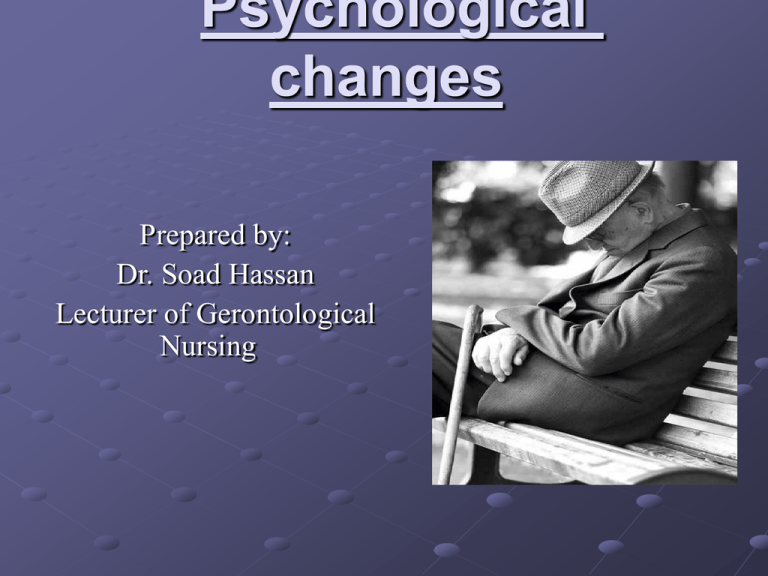Psychological_changes
advertisement

Psychological changes Prepared by: Dr. Soad Hassan Lecturer of Gerontological Nursing Most elderly people seems to be most vulnerable to psychological dysfunction when they experience change. Affective function refers to the mood, emotions (such as happiness, sadness, fear, pain, anger, and confusion). Cognitive function refers to memory, learning, and intelligence. Cognitive and affective functioning affects the person’s self-esteem. 17/4/2011 Dr Soad Hassan 2 Affective functioning It is influenced by the way an individual views the world and self. A positive view of self and surrounding environment promotes positive expression of mood and emotions. 17/4/2011 Dr Soad Hassan 3 1- Self-esteem It is the way a person views himself/herself. A positive view of self promotes health and enables the person to cope better with the changes and challenges of growing older. 17/4/2011 Dr Soad Hassan 4 Factors contribute to a decreased in self-esteem Age related changes. losses that occur with aging Chronic diseases. Increased dependency . Function impairment. Lack of control over the person environment 17/4/2011 Dr Soad Hassan 5 2- Personality The basic personality does not change as a result of aging process. The personality will be consistent with that of earlier years. 17/4/2011 Dr Soad Hassan 6 3- Depression Depression occurs 16-65% of elders living in the community. Depression including: sleep disturbance, lake of interest, feelings of guilt, lack of energy, decreased concentration and, loss of appetite. Losses can lead to depression. 17/4/2011 Dr Soad Hassan 7 Cognitive functioning Intelligent, learning, attention and memory are all related to cognitive functioning and how well the mind is able to reason and make sound judgments. 17/4/2011 Dr Soad Hassan 8 1- Intelligent Intelligent is a mental alertness and includes the ability to learn new material, make wise decisions, and deal with stressful situation. Intelligent does not become less with age. IQ test performance of older adults may be hindered because of sensory deficits or the stress of being tested. These factors must be considered when assessing 17/4/2011 Dr Soad Hassan 9 2- Memory Recent memory is defined as a recall of items learned more than a few minutes earlier, e.g. the day's new events, what was eaten for breakfast, the date. Recent memory generally declines with age. Remote memory is defined as a recall of items learned many years earlier, e.g. the dates of wars, names of presidents, remote memory does not experience significant change with age. 17/4/2011 Dr Soad Hassan 10 3- Learning Learning is the acquisition of new knowledge or skills. The ability of the mind to learn and retain new information remains unaltered, particularly when mind is stimulated through regular use. The ability to solve complex problems decline with age. Hearing and visual deficits related to aging process can affect learning. 17/4/2011 Dr Soad Hassan 11 4- Attention span There is decrease in vigilance performance. Vigilance performance is the ability to retain attention longer than 45 minutes. The elderly is more liable to distract (divert) attention by irrelevant information and stimuli. Deficits in attention may affect learning and memory. 17/4/2011 Dr Soad Hassan 12 Social Changes 17/4/2011 Dr Soad Hassan 13 The social changes that come with life are change in life style, loss of other family members, neighbors and friends. The main social problems, which confront elderly persons, are: - social isolation - finance - loneliness - rejection and loss of purpose in life. - deterioration in housing standard and poor nutritional level. 17/4/2011 Dr Soad Hassan 14 1-Retirement A change in work role comes with retirement. It changes the way time is managed and daily activities are carried out. Retirement alters identity, status, financial problem, lack of self-satisfaction and selfesteem and sometimes friendships. 17/4/2011 Dr Soad Hassan 15 2- Widowhood A common event that alters family life for the aged is the death of a spouse. The spousal role composed of many sub roles, such as companion, sexual partner, confidante, cook, house-keeping, and care provider. Loss of spouse is a highly stressful experience. Death of a spouse affects more women than men because most older men will marry again . 17/4/2011 Dr Soad Hassan 16 3- Loneliness Loneliness is the feeling of emotional isolation, being locked inside oneself and unable to obtain the warmth and comfort from others. Any loss that creates a deficit in intimacy and inner personal relationships can lead to loneliness. 17/4/2011 Dr Soad Hassan 17 4- Role change (role reversal) Numerous role changes occur with the aging process, but the transitions expected by most elders are related to the work role and the role of spouse or partner. 17/4/2011 Dr Soad Hassan 18 5- Multiple losses Aging is associated with major physical, psychological and sociologic losses as well as a reduced ability to adapt and compensate for stressors. 17/4/2011 Dr Soad Hassan 19 Examples of some losses Loss of job (retirement) Loss of status Change role Loss related to normal age-related changes Decreased income Increase expenditure on medical services Loss of significant person Loss of housing Decreased the ability to adapt and compensate for stressors Limitations impose as a result of multiple chronic diseases 17/4/2011 Dr Soad Hassan 20 Awareness of Mortality Widowhood, death of friends, and the recognition of declining functions make older person more aware of the reality of their own death. Attitudes about death vary with aging. The elderly tend to think and talk about death, but they find the prospect of death less frightening. 17/4/2011 Dr Soad Hassan 21 Psychosocial problems Poor adjustment to role changes Poor adjustment to lifestyle changes Family relationship problems Grief Low self-esteem Anxiety and depression Aggressive behavior 17/4/2011 Loneliness Isolation Problems with sexuality Elderly abuse Withdrawing and having a negative attitude toward life in general Dr Soad Hassan 22 Developmental tasks needed for successful aging 1. Adjusting to declining health and physical strength. 2. Adjusting to retirement and reduce income 3. Adjusting to death of a spouse. 4. Establish associations with others in the same age. 5. Maintaining a satisfactory living arrangement. 6. Adapting to changes in social roles. 17/4/2011 Dr Soad Hassan 23 Role of the gerontological nurse to promote psychosocial adaptation 1. The psychosocial assessment is an essential component of the overall health assessment 17/4/2011 Dr Soad Hassan 24 2- Nursing intervention to enhance mental alertness Allow the client to do as many tasks for himself as possible. Encourage use of the mind in problem solving. Encourage use of numbers and calculations. Encourage creative activities (e.g. painting, story telling). Encourage the discovery of new talents and abilities. 17/4/2011 Dr Soad Hassan 25 3- Nursing intervention when caring for a client with a shortterm memory loss Identify yourself each time there is an interaction with the client. Give instructions in simple, direct terms. Repeat instructions several times. Explain every thing that is happening, even if the client does not seem to understand. Perform only one activity at a time. Report any sudden confusion. 17/4/2011 Dr Soad Hassan 26 4- Nursing intervention when teaching an older person new information Assess current knowledge. Evaluate for any visual or hearing deficit. Make sure the hearing aid is working or glasses are available, if indicated. Determine the person's ability to learn. Identify any language barrier. Determine if the information to be taught is thought to be important or relevant to the elderly person. 17/4/2011 Dr Soad Hassan 27 Begin by reviewing familiar information and then more to new information. Teach the spouse or family member as well as the elderly person if possible. Plan teaching over several days, with small increments of information presented at one time. Actively involve the client in the learning process. Allow time for feed back to evaluate knowledge 17/4/2011 Dr Soad Hassan 28 5- Nursing role to increased self-esteem Develop a trusting relationship Treat the elderly with dignity and respect Allow sufficient time for the performance of daily activities of self-care Encourage verbalization Practice active listening 17/4/2011 Dr Soad Hassan 29 Give positive reinforcement for progress. Use reminiscence therapy (encourage the elderly to recall or remember past events). Be alert for opportunities to include the patient in decision making. Use verbal and non verbal communication Encourage socialization. 17/4/2011 Dr Soad Hassan 30 6- Nursing intervention that foster positive personality traits in elderly 17/4/2011 Accept the elderly. Identify the positive characteristic of each elderly. Encourage verbalization. Reward positive behavior. Avoid a judgmental attitude. Dr Soad Hassan 31 7- Adjusting to retirement It is easier if activities that will become prominent after retirement are begun during the working years. Therefore, adjustments to retirement are influenced by pre-retirement plan and engaging in other activities before withdrawing completely from their work. 17/4/2011 Dr Soad Hassan 32 9- Find a new role Such as a grandparent role. The grandparent role is generally one that brings great satisfaction and contentment. 17/4/2011 Dr Soad Hassan 33 10- Facilitating maximum independence Make sure that the person has access to all necessary assistive devices and personal accessories. Allow enough time for the person to perform tasks at her or his own place Make sure that the environment has been adapted as much as possible to compensate for sensory losses and other functional impairments. 17/4/2011 Dr Soad Hassan 34 11- Intervention that promotes social support Use interventions to deal with hearing impairments and other communication barriers. Encourage participation in group activities. For people in wheelchairs, especially those who cannot move independently, position the chairs in a way that promotes social interaction. For nursing home residents, plan tables and room arrangements in such a way that social relationships are fostered 17/4/2011 Dr Soad Hassan 35 Thank you 17/4/2011 Dr Soad Hassan 36








